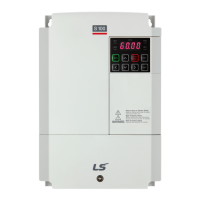Learning Advanced Features
Sensorless Vector Control Operation Guide for Induction
Motors
The amount of starting
torque is insufficient.
Cn.09 PreExTime
Cn.10 Flux Force
Cn.31 ACR SL P Gain
Cn.54–57 Trq Lmt
Cn.93 SL Volt Comp3
Set the value of Cn. 90 to be more than 3
times the value of bA.24 or increase the
value of Cn.10 by increments of 50%. If the
value of Cn.10 is high, an overcurrent trip at
start can occur. In this case, reduce the value
of Cn.31 by decrements of 10.
Increase the value of Trg Lmt (Cn.54-57) by
increments of 10%.
Increase the value of Cn.93 by increments of
5.
The output frequency is
higher than the base
frequency during no-load
operation at low speed
(10Hz or lower).
Decrease the value of Cn.91 by decrements
of 5.
The motor hunts or the
amount of torque is not
sufficient while the load
is increasing at low
speed (10Hz or lower).
Cn.21 ASR-SL P
Gain1
Cn.22 ASR-SL I Gain1
Cn.93 SL Volt Comp3
If the motor hunts at low speed, increase the
value of Cn.22 by increments of 50m/s, and
if hunting does not occur, increase the value
of Cn.21 to find the optimal operating
condition.
If the amount of torque is insufficient,
increase the value of Cn.93 by increments of
5.
If the motor hunts or the amount of torque is
insufficient in the 5-10Hz range, decrease
the value of Cn.04 by increments of 1kHz (if
Cn.04 is set to exceed 3kHz).
The motor hunts or
overcurrent trip occurs in
regenerative load at low
speed (10 Hz or lower).
Increase the value of Cn.92-93 by
increments of 5 at the same time.
Over voltage trip occurs
due to sudden
acceleration/deceleration
or sudden load
fluctuation (with no brake
resistor installed) at mid
speed (30Hz or higher).
Decrease the value of Cn.2 by decrements
of 5%.
Over current trip occurs
due to sudden load
fluctuation at high speed
(50 Hz or higher).
Decrease the value of Cn.54-57 by
decrements of 10% (if the parameter setting
is 150% or higher).
Increase/decrease the value of Cn.94 by

